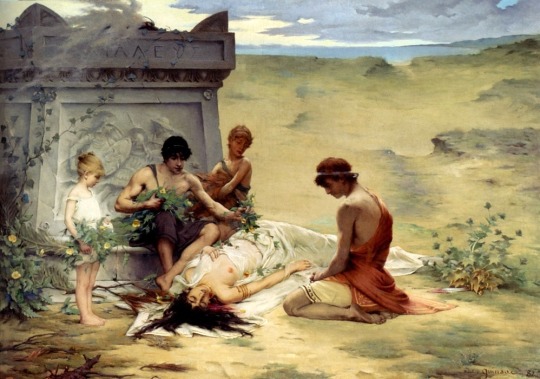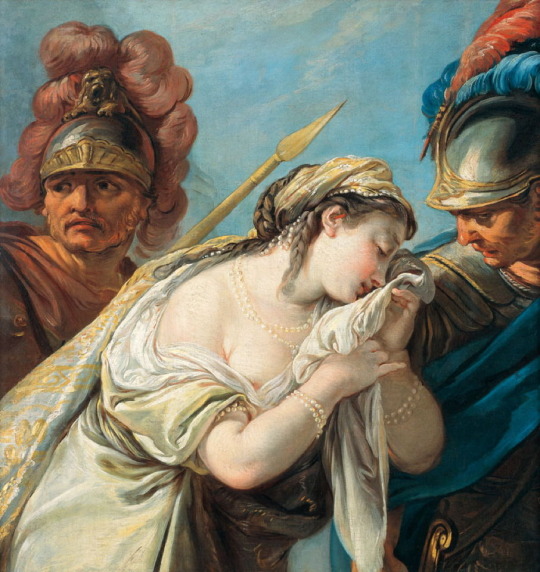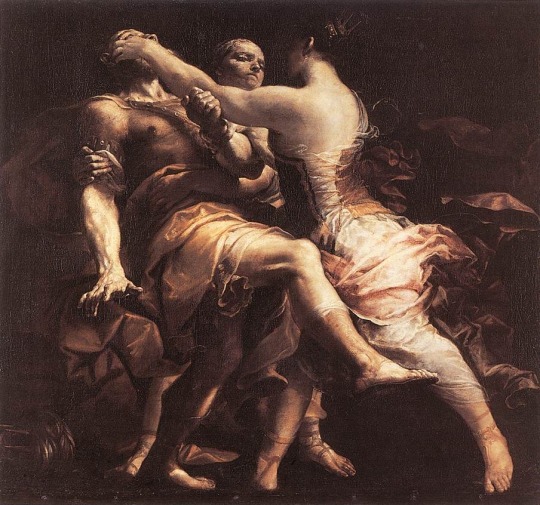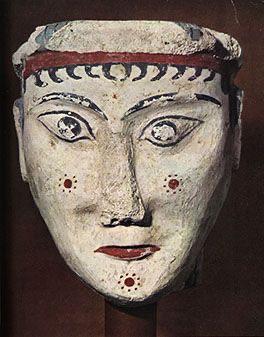#trojan women
Explore tagged Tumblr posts
Text



Andromache :(
So this qoute is from a book about the french revolution by Chevalier Nicolas de Maistre, and the full thing is ;
" I was a queen, and you dethroned me. I was a wife, and you killed my husband. I was a mother, and you tore me from my children. Only my blood remains: you are thirsty. Drink it. Hasten to meet it that you may drink it."
#I hate so much what happens to her#in hindsight this qoute might fit Hecuba even better#but i didn't think about that until halfway through this#sketch#trojan war#tagamemnon#digital art#the iliad#andromache of troy#Andromache#hector of troy#hector#Hektor#scamandrius#astyanax#Comic#sort of#there was an attempt#art#trojan family#greek mythology#character design#post fall of troy#post war#trojan women#character art#iliad art#marie antoinette
87 notes
·
View notes
Text
I’m fine with taking creative liberties in adaptions but shifting the blame for Astyanax’s murder to Zeus instead of Odysseus (or at least Neoptolemus) has been disastrous to Trojan war discussions, bc now dumb ppl who have never read the Iliad or Odyssey or watched any adaptations of the Trojan women will think that big mean Zeus pressured poor boy dad Odysseus into killing Astyanax. As if Zeus didn’t favour Hector and was hesitant to destroy Troy.
#sorry I’m really mad today#i hate the epic musical fandom i’m sorry#like how tf did y’all get me to defend Zeus I fucking hate him#rambles#rants#greek mythology#ancient greek mythology#greek pantheon#Troy#Trojan war#trojan cycle#trojan women#epic the musical#epic odysseus#epic the troy saga#Odysseus#astyanax lives#astyanax#Andromache#zeus#lord zeus#epic zeus#zeus greek mythology
250 notes
·
View notes
Note
Something I find interesting when people discuss pieces like "The Trojan Women" is that some of them seem to be under the impression that the Trojans would never have treated the Achaean women the same way had their places been switched, which is...a really unlikely scenario 😅 Everyone needs to understand that both sides are very much full of war criminals who wouldn't hesitate to get rid of the men and enslave the women.
For real. Ironically Euripides seems to be implying that this would be EXACTLY what can happen to their OWN women and children in the war (given how the play was most likely premiered in year 415 BC during Peloponnesian War).
Euripides seems to be criticizing the way Athena treated the city of Melos in the island and the slaughter that happened and uses the example of Trojan Women to show brutality of war to the Athenean public. However it also seems to me a way to show them that things done BY you could happen TO you and thus giving the Athenean public a taste of the consequences of war as a criticism to the cruelty of Athens against Melos.
I find it funny to say the very least how people remove the historical context of not only the ancient greek tragedies but also the general background of culture. Trojans often are pictured to have very similar customs as the Greeks. Even without knowing that war captives and slaves were also done in the area by other empires even by the element that Trojans have similar culture as the Greeks in Homer is proof enough that Trojans would most likely, if not certainly, do the same things to Greeks. The point of Trojan Women was social criticism not to be used as proof that the Greeks were uniquely cruel as opposed to Trojan people who were supposed to be "angels". On the contrary.
In fact even cases of women of Troy who are so familiar to this outcome or that they are prepared for the tragic events that shall follow proves that they are familiar to the custom. In one way they knew their men would do that to Greeks if they could and now they are the target of it. Either way the Greek cruelty was given so raw not because it was an exclusive feature of the Greeks but because Euripides was criticizing the Athenean society at that time.
59 notes
·
View notes
Text
After you realize what happened to the women of Troy it will make your heart ache but
do you think Hector was more devastated by meeting his son in the Underworld or by not meeting his wife here?
#the baby didn't make it to the burial so he will most likely lie for 100 years before Cheron takes his soul but that's a detail#epic#epic the musical#epic hector#hector of troy#andromache#andromache of troy#astyanax#scamandrius#this is his real name btw#my thoughts#firinnie#trojan war#trojan women#epic the troy saga#troy saga
57 notes
·
View notes
Text
You know who I’d like to see more stories about? Hecuba, the Queen of Troy. Her story is genuinely so tragic.
She loses her husband, all of her children, and her kingdom/title
She finds out that one of her daughters, Polyxena, was “claimed” by the ghost of Achilles’ as one of his spoils of war and she is brutally murdered at his tomb
Her other daughter, Cassandra, is claimed by Agamemnon the asshole as his “bride prize” and she’s carted off, never to be seen again
Her daughter-in-law is also shipped off to be a “bride prize”
Her grandson is thrown off a roof by Odysseus, the man who Hecuba becomes the “prize” of
As she sets off for Ithaca, she finds out that the man who was supposed to be keeping guard over her last remaining son, Polydorus, has not only stolen the riches meant for him, but that Polydorus had also been murdered
But despite that, in my mind, she gets the last laugh. Not only does she claw out the eyes of and (in some interpretations) kill the man who killed her final son, she manages to be free from having to belong to Odysseus by turning into a dog and even the gods take pity on her.
Hecuba’s story is another wonderful example of the rage of a bereaved mother and the incredibly sad realities of what happened to the losing side after a war.
#ancient greek#greek mythology#hecuba#Hecuba of Troy#trojan war#trojan women#Greek myth#odysseus#greek retelling#mythology#greek gods#essay writing#mini essay#essay#go peep Trojan Women#it’s a touch dry but still a good read#also read Hecuba it’s also by Euripides#agamemnon#idk Hecuba has just been on my mind recently#her story is up there with Demeter’s story for me
72 notes
·
View notes
Text

— Euripides, Trojan Women (trans. by A. Shapiro)
#PALABRAS 📝#I need to make a compilation of scary shit Athena says in Greek lit.#ancient greek literature#euripides#trojan women#id in alt text#athena#poseidon
70 notes
·
View notes
Text









#somebody stop me please#house of the dragon#rhaenyra targaryen#rhaenys targaryen#euripides#helen of troy#trojan women#philip vellacott#web weaving#hotd#iliad#trojan war
76 notes
·
View notes
Text
petition to change “written by a woman” into “written by euripides”
#no one understands women the way this man understands women and i stand by this#greek mythology#greek myth#euripides#trojan women#clytemnestra#medea#women of troy#aphrodite#cassandra of troy#<- just to name a few. this man is a genius.
460 notes
·
View notes
Text

Playing with this idea of making all the women from the Trojan war unpalatable to our modern tastes
44 notes
·
View notes
Text










- just a girl x the women of the trojan war
#absolutely obsessed with Florence’s cover#no doubt#just a girl#florence + the machine#the Trojan women#trojan women#polyxena#helen of troy#Cassandra#Cassandra of Troy#Hecuba#briseis#art#pre raphaelite#lyrics#web weaving
259 notes
·
View notes
Text
First draft of the first chapter of Tearing Tides, a post-Trojan-War story following Andromache after the death of Helenus, being granted immortality and living through all the many epochs of humanity :
He was dead. His blood slid against the stone floors like thick, oily tar, dark and glimmering in the dim light of the room
The man who had married her was dead
The man who had taken his brother’s wife as though she were a prize, to be owned and inherited, was dead.
The Prophet of Troy was dead, throat split open with a knife in the dead of night, his oracular voice slipping out with the gushes of his crimson-black blood, never to be sounded again
Andromache stumbled back, half out of shock and half with the dizzying rush of absolute TRIUMPH. The bloodied knife slipped from her trembling fingers, a spill of ruined starlight against the dim light cast by the sputtering candle she held in her other hand
A loud clatter sounded out as it hit the ground blade-first, its sharp edge cutting a faint groove in the red-spattered gray of the stone
Helenus didn’t stir. His lips were parted, as though to speak, to wheedle and deceive like he had done so many times before. To Briseis. To her. To all the wives of the sons of Troy.
But no trace of whiny, nasal voice emerged. The prophet was gone, and all at once, a great weight seemed to lift off Andromache’s shoulders, so stunning in its relief that she nearly fell to her knees
But she was a warrior queen of Troy, no matter how much her pride may have been broken in the beds and throne rooms of these Achaeans. And a warrior queen she would remain. Right up to the end
Reaching down, she wrapped her fingers tentatively about the blood-slick knife hilt, lifting it up to stare into its sullied blade, blood dripping off it and rejoining the growing puddle of scarlet below with steady drip-drips that seemed loud as thunderclaps in the stillness of night
Hector, my love, I’m coming
She lifted it high, and prepared to drive it deep into her breast. The knife rose and fell, a glimmering streak of silver, and Andromache braced herself for the sharp stab of pain that was sure to come next
It never came. The broken splinters of the blade clattered against the earth. She stared at the empty, leather-bound hilt of what had once been a knife
Before she could pray, or protest, or do ANYTHING other than stare dumbly as her only hope of salvation was torn away from her, a surge of golden light filled the room. The twang of a bowstring being plucked. The sweet sound of a lyre.
Brilliant, burning eyes in the night. Immaculate lips moving with vindictive hate. A curse being cast from on high
Helenus was a prophet of Apollo. And Apollo, the god who had wrestled his own mortal half-brother to a standstill for insulting one of his seers, had always been protective of his priests
All at once, a sweet voice seems to sound through the room, music personified, with no source and no end, and yet, gratingly, shrilly, unnatural. Too perfect. Too unreal.
There will be no salvation for thee, murderess of my prophet. If death is what thee desire the most, then death will be what I take from thee, now and forever
The myth of Psyche. Mortal made god. The myth of Hyacinthus, and Narcissus, and Heracles. And now, the myth of Andromache - the mortal to whom eternity had come as a curse
She does not know what she did next. She only knows the mouthfeel of the curses spilling from her lips like the last breaths of the man lying beside her, the thudding force her knees impacting the stone floor, her chiton quickly growing wet and dark with her husband’s blood
She remembers the feel of godly magic within her, the way her nails seemed to refuse to find purchase in her flesh, no matter how hard, how desperately, she scratched at her skin.
How ironic, that she be inflicted with the blessing of the very man who had taken everything from her. Akhilleus’ ghost liked its twisted jokes, it seemed
She had heard that he, too, had mourned someone he loved, once. That his life being taken from him had been why he had taken her life from her
But he had died. He had had that, at least, if nothing else. Andromache didn’t even have that. The gods truly hated their Trojan children, it seemed
She stared down at the floor, at the scarlet threads of blood webbing through the cracks and crevices of the stone like the branches of some vast tree, ever-extending, ever-flowering
She had known a tree, once. It had grown in her garden, back in Troy. Her love had planted it for her, with her own two hands.
Ithacan Ulixes, he had told her, had made his wife a bed out of an olive tree. But not even he had GROWN her one.
So he had planted a laurel tree for her, intending to turn it into a bed when it grew old enough. Her love had always been the competitive kind
He had never gotten the chance. He had died before he could. And then, the tree burned. It seemed almost comedic that Ulixes be the one who had caused the fire that consumed it, like one of those Achaean tragedies her father used to tell her about on his knee
Her father, who had fallen when Akhilleus took Cilicia. Along with all her older brothers. That Achaean bastard had truly robbed her of everything, hadn’t he ?
And yet, it wasn’t his fault, either, was it ? Not even Agamemnon’s, if she really allowed herself to admit it. Eyes unclouded by her vengefulness and anger, she could admit that, if anything, the gods had been the ones to twist all of their fates into tangled, frayed threads, and that the blame for it could not, indeed, be laid at the feet of any one mortal
Andromache was not feeling particularly inclined to look past her vengefulness and hate right now, so she simply went back to hating Akhilleus. It seemed safer than hating the gods
Her mind whirred, cold and clinical, refusing to process the gravity of her fate. Andromache had always been a clever one - not just for a women, either, Hector had told her once, just clever. Cleverer than me, even - and all that cleverness was put to work now
Idly, she wondered if trying to climb Mount Olympus and attack Apollo would rid her of the curse, the better to smite her, or if she would just be, like Prometheus, sentenced to an eternity of torment
(Just to be noted - in this book, Andromache is a trans man. The reason I refer to him as she/her here is because he only really DISCOVERS that some time around the 1900s, though he does develop a curiosity about certain aspects of gender androgyny when he visits the Viking lands and learns of their gods)
#no italics or bolding#because I wrote this on my Notes app#in ten minutes#andromache#andromache of troy#riptide#Anaklusmos#apollo#Hector of Troy#hector#Helenus#Helenus of Troy#I don’t hate Helenus btw#but Andromache probably does#also I needed a reason for her to be immortal#trojan war#trojan women#the iliad#greek mythology#achilles#achilles x patroclus#tagamemnon#iliad achilles#tearing tides#patrochilles#trans rights#trans#trans pride#trans man#transmasc
14 notes
·
View notes
Text
something something about astanyx being called scamandrius and him being washed in the Scamander to heal the wounds on his dead body (Trojan Women, Euripides)
#homer#the iliad#greek mythology#trojan war#astanyx#andramache#hekabe#hektor#hector of troy#Priam#odysseus#Ulysses#scamandrius#euripedes#trojan women
34 notes
·
View notes
Text
“What if Odysseus adopts Astyanax 🥰” tf happens to Andromache in that timeline then?
#trying to make your problematic fave less problematic by decentering the women he caused suffering to#reminds me of how Hades and Demeter are portrayed on here ngl#greek mythology#ancient greek mythology#greek pantheon#Odysseus#astyanax#hector and andromache#andromache of troy#Andromache#odyssey#Iliad#trojan women#Troy
211 notes
·
View notes
Text
According to Dares the Phrygian Helen has a beauty mark between her brows! What do you know? Greeks possibly considered moles attractive from that time hehe 😜 but now I remember this amazing mycenaean female head from around 1300 BC

And now I imagine Helen when doing her makeup instead of painting the usual sun on her forehead she just draws the dots around her beauty mark instead! 🤔
#greek mythology#tagamemnon#the odyssey#odyssey#the iliad#iliad#helen#helen of sparta#helen of troy#helen x menelaus#the most beautiful woman in the world#the woman that launched 1000 ships#dares the phrygian#heroes of trojan war#troy#trojan women#trojan horse#trojan war#sacking of troy#troy´s aftermath#helen and menelaus#homeric poems#homer odyssey#homer iliad#homeric epics#epic#epic cycle#homer#headcanons#helen headcanon
65 notes
·
View notes
Text

This was the attendance question in my classic civ class today and there were some polarizing opinions, so:
10 notes
·
View notes
Text

WIP that I probably won’t finish
#art wip#wip#greek myth#greek myth art#ancient greek#cassandra of troy#trojan war#trojan women#trojan horse#greek mythology#my art#digital art#art#maybe I’ll finish this#but not today
25 notes
·
View notes